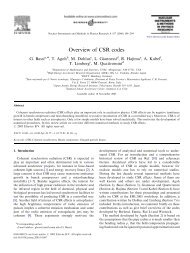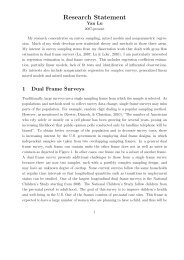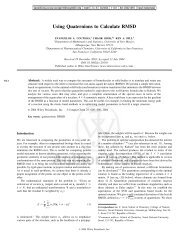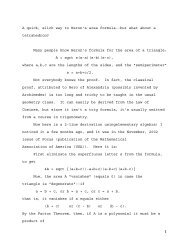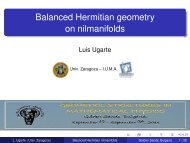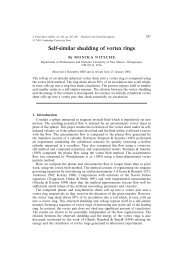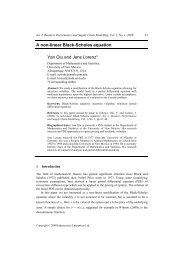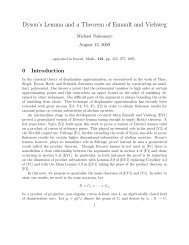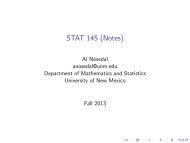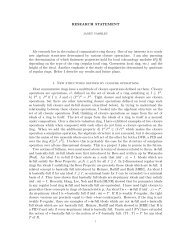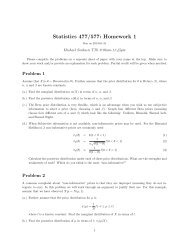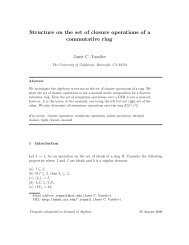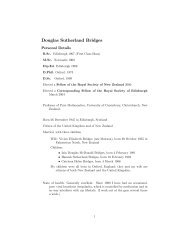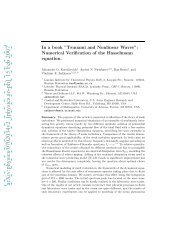OEO Office of Equal Opportunity - Department of Mathematics and ...
OEO Office of Equal Opportunity - Department of Mathematics and ...
OEO Office of Equal Opportunity - Department of Mathematics and ...
Create successful ePaper yourself
Turn your PDF publications into a flip-book with our unique Google optimized e-Paper software.
PSYCHOLOGY 279<br />
scores; the normal distribution <strong>and</strong> the central limit theorem;<br />
the logic <strong>of</strong> hypothesis testing; correlation <strong>and</strong> regression;<br />
multiple regression. {Fall}<br />
Corequisite: 503L.<br />
502. Design <strong>and</strong> Analysis <strong>of</strong> Experiments. (3)<br />
Introduction to the logic <strong>of</strong> experimental design <strong>and</strong> to<br />
experimental designs commonly used in psychology <strong>and</strong> the<br />
corresponding analyses. {Spring}<br />
Corequisite: 504L.<br />
503L. Advanced Statistics Laboratory. (1)<br />
Computational techniques for statistical methods introduced<br />
in 501. Emphasis placed on the use <strong>of</strong> a computerized statistical<br />
package, e.g., SPSS®.<br />
Corequisite: 501. {Fall}<br />
504L. Design <strong>and</strong> Analysis <strong>of</strong> Experiments Laboratory.<br />
(1)<br />
Practical issues related to material introduced in 502.<br />
Emphasis placed on use <strong>of</strong> a computerized statistical package,<br />
e.g. SPSS®.<br />
Corequisite: 502. {Spring}<br />
505. Research Seminar. (1 to a maximum <strong>of</strong> 3) ∆<br />
Facilitates development <strong>of</strong> active research in first-year graduate<br />
students. Presentations include 1) research lectures by<br />
faculty <strong>and</strong> graduate students; <strong>and</strong> 2) research proposals by<br />
class members, critiqued by instructor <strong>and</strong> classmates.<br />
506. Seminar in Mathematical Psychology. (3)<br />
Discussion <strong>of</strong> recent research in various areas <strong>of</strong> mathematical<br />
psychology, including behavioral decision theory<br />
<strong>and</strong> mathematical learning theory.<br />
511. History <strong>and</strong> Systems <strong>of</strong> Psychology. (3)<br />
Survey <strong>of</strong> historic <strong>and</strong> contemporary systematic issues <strong>and</strong><br />
conceptual viewpoints in psychology.<br />
<strong>of</strong> cognitive development <strong>and</strong> subsequent challenges, both<br />
theoretical <strong>and</strong> empirical, to that model.<br />
530./430. Alcoholism. (3)<br />
Causes, course, prevention <strong>and</strong> treatment <strong>of</strong> problem drinking.<br />
531. Pr<strong>of</strong>essional Issues in Clinical Psychology. (3)<br />
An exploration <strong>of</strong> the pr<strong>of</strong>essional contexts that have led to<br />
the development <strong>of</strong> modern clinical psychology <strong>and</strong> a review<br />
<strong>of</strong> the ways pr<strong>of</strong>essional issues are relevant to practice <strong>and</strong><br />
research in psychology.<br />
532. Seminar in Psychopathology. (3)<br />
A research-bases course that provides a comprehensive<br />
study <strong>of</strong> abnormal behavior. It stresses diagnosis <strong>and</strong> assessment<br />
<strong>of</strong> psychopathology <strong>and</strong> examines various theories <strong>of</strong><br />
etiology. Recommended treatments are mentioned briefly.<br />
533. Psychological Evaluation: Cognitive <strong>and</strong><br />
Neuropsychology Functions. (3)<br />
Provides an introduction to intelligence testing, contemporary<br />
factors influencing intellectual performance, <strong>and</strong> clinical interpretation<br />
<strong>of</strong> cognitive tests. The neuropsychological implications<br />
<strong>of</strong> cognitive deficits are reviewed, along with different<br />
approaches to neuropsychological assessment.<br />
534L. Practicum in Psychological Evaluation. (3)<br />
Practicum experience in the administration <strong>and</strong> interpretation<br />
<strong>of</strong> cognitive <strong>and</strong> personality tests.<br />
535. Psychological Evaluation: Personality Functions.<br />
(3)<br />
This course examines: 1) psychometric principles involved<br />
in the development <strong>and</strong> evaluation <strong>of</strong> psychological tests; 2)<br />
major means <strong>of</strong> personality inventory construction; <strong>and</strong> 3) the<br />
general logic <strong>of</strong> major personality assessment procedures,<br />
including MMPI <strong>and</strong> Rorschach.<br />
ARTS AND<br />
SCIENCES<br />
512. Advanced Health Psychology. (3)<br />
This course will examine research <strong>and</strong> theory on important<br />
issues in health psychology including stress, health behaviors,<br />
<strong>and</strong> managing chronic disease. Learning tools include<br />
analyzing, synthesizing, <strong>and</strong> integrating these readings <strong>and</strong><br />
discussing them in class.<br />
513. Emotion <strong>and</strong> Health. (3)<br />
This course will examine research <strong>and</strong> theory on the application<br />
<strong>of</strong> psychology interventions to health problems including<br />
coping with illness <strong>and</strong> health behavior change. The interventions<br />
will include stress management, mediation, <strong>and</strong> cognitive<br />
behavioral therapies.<br />
514. Health Psychology. (3)<br />
This course will involve examine research <strong>and</strong> theory on<br />
issues in the study <strong>of</strong> emotion <strong>and</strong> health. Areas covered<br />
include the psychology <strong>of</strong> emotion, emotion <strong>and</strong> mental<br />
health, emotion <strong>and</strong> physical health, <strong>and</strong> emotional intelligence.<br />
**521./421. Advanced Developmental Psychology. (3)<br />
Investigation <strong>of</strong> the theoretical bases <strong>and</strong> critical issues in the<br />
area <strong>of</strong> developmental psychology.<br />
522./422. Child Language. (3)<br />
(Also <strong>of</strong>fered as LING 560.) Theories, methodologies <strong>and</strong><br />
findings in child language, from birth to late childhood.<br />
Emphasizes implications <strong>of</strong> child language data for linguistic<br />
<strong>and</strong> psycholinguistic theories. Topics: biological foundations;<br />
pre-linguistic communication; phonological, syntactic, semantic<br />
<strong>and</strong> pragmatic development; bilingualism.<br />
523./323. Social Development. (3)<br />
A seminar that integrates theory <strong>and</strong> research focused on<br />
social dynamic processes <strong>and</strong> relationship-formation within<br />
cultural settings throughout development.<br />
528. Seminar on Cognitive Development. (3)<br />
A seminar covering theory <strong>and</strong> research on the development<br />
<strong>of</strong> cognition, organized around Piaget’s constructivist model<br />
**536./436. Family Psychology. (3)<br />
Focuses on the major theoretical approaches to family dysfunction<br />
<strong>and</strong> examines family influences on the development<br />
<strong>and</strong> maintenance <strong>of</strong> deviance, including juvenile delinquency,<br />
substance abuse, anorexia nervosa, depression <strong>and</strong> schizophrenia.<br />
**539./439. Child Psychopathology. (3)<br />
Theories <strong>and</strong> practices related to an underst<strong>and</strong>ing <strong>of</strong> children<br />
<strong>and</strong> adolescents who deviate from normal development<br />
either intellectually, educationally, emotionally, physically<br />
or in some combination. Relevant family variables are<br />
considered.<br />
540. Biological Bases <strong>of</strong> Behavior. (3)<br />
Provides an introduction to basic aspects <strong>of</strong> neuroscience;<br />
e.g., historical perspectives, neurocytology, neurophysiology,<br />
neurochemistry, neuropharmacology, neuroanatomy. In depth<br />
critical discussion <strong>of</strong> fundamental <strong>and</strong> current topics.<br />
542. Seminar in Recovery <strong>of</strong> Function <strong>and</strong> Epilepsy. (3)<br />
Focuses on the literature <strong>and</strong> current experiments on epilepsy<br />
<strong>and</strong> functional recovery, the two major problems following<br />
traumatic brain injury or stroke. Mechanisms <strong>of</strong> these<br />
processes <strong>and</strong> clinical advancements will be discussed.<br />
547. Drugs <strong>and</strong> Behavior. (3)<br />
Study <strong>of</strong> the pharmacological action <strong>and</strong> physiological <strong>and</strong><br />
psychological effects <strong>of</strong> drugs <strong>of</strong> abuse including stimulants,<br />
depressants, narcotics <strong>and</strong> hallucinogens. Course may be<br />
used towards major.<br />
551. Graduate Problems. (1-3, no limit) ∆<br />
561. Cognitive Processes I. (3)<br />
Surveys the major topics <strong>and</strong> issues in lower order cognitive<br />
processes. Includes coverage <strong>of</strong> fundamental theoretical <strong>and</strong><br />
empirical work in sensory detection, attention, perception,<br />
<strong>and</strong> motor control.<br />
UNM CATALOG 2006–2007 Symbols, page 611.



